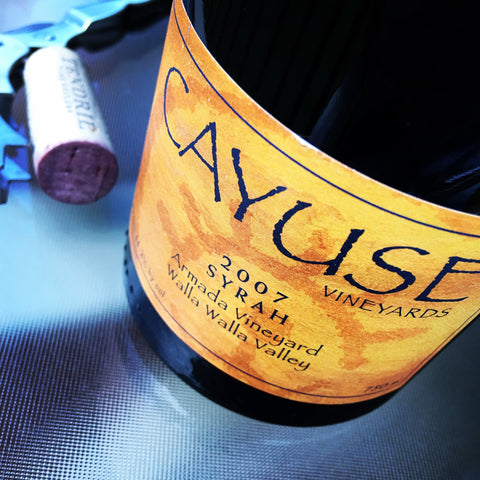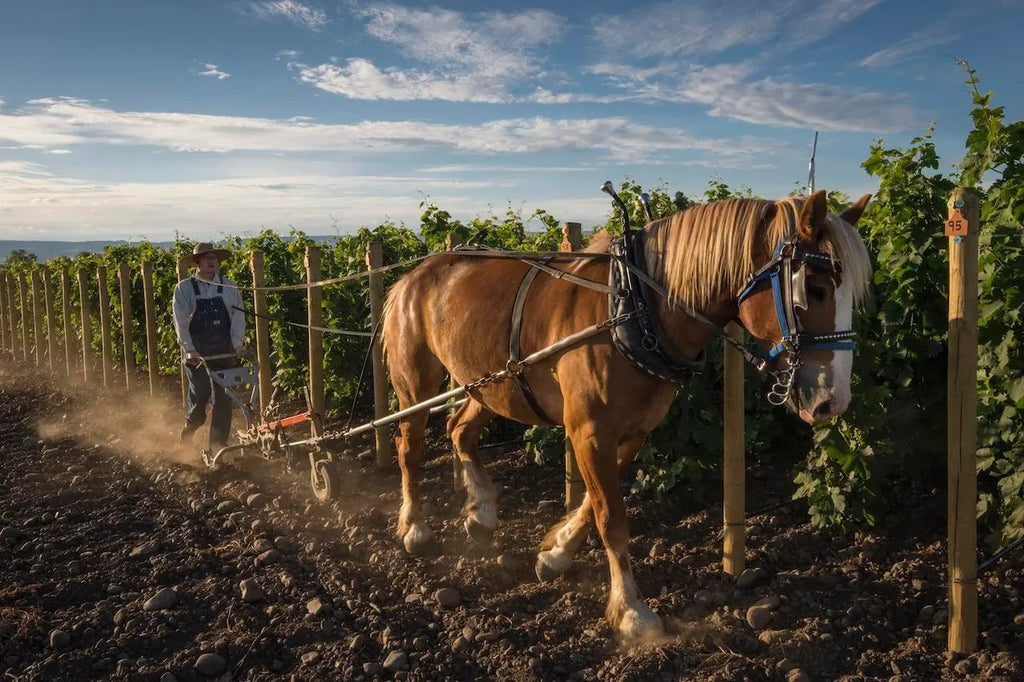Among the most compelling examples of Syrah outside France are made in the most unlikely of places—on the Oregon side of the Walla Walla Valley—and by a Frenchman, born not in the Rhône, but in Champagne.
The winemaker is Christophe Baron, who discovered an area in the valley littered with cobblestones. Astonished by the Châteauneuf-like stones, he instinctively knew he could make great wine here. He planted the first commercially successful vineyards in these stones, including Coccinelle Vineyard in 1996. But Christophe was inspired less by Châteauneuf du Pape than the great wines of Cornas and Côte Rôtie. And so, in 1998, he planted Syrah in Coccinelle. And in 2000 he made the first vintage of the wine that would make him a cult superstar, Bionic Frog.

In Search of the Essence
Bionic Frog is arguably America’s most sought-after Syrah. Only 300 cases are made. Reportedly only one American retailer receives an annual allocation: The Rare Wine Co. However, because of Chapter 4's long held private client relationships we have regularly secured parcels of this highly allocated wine for our own shop. Our private client inventory is acquired ex-cellars and are retrieved from private home cellarage or professional off-site wine storage here in Los Angeles.
According to The Rare Wine Co: they are accorded this special allocation privilege for two reasons. The first is their longstanding belief in Christophe. But the other is a shared passion for the Syrah grape—and the great Northern Rhône winemakers that have been role models for him. These include Thiérry Allemand, Verset and Auguste Clape from Cornas; Hermitage’s Chave; and Rostaing and Jamet from Côte Rôtie. The work of each of these legends has played a part in developing Christophe’s winemaking philosophy. Christophe's vines are now 100% biodynamic, and he relies solely on native yeasts, with partial whole-cluster fermentation and yields of 1.2 to 2 tons per acre.
Today, he uses very little new wood. All Cayuse reds, including Bionic Frog, now see only 15 to 20% new oak. He is also gravitating towards larger barrels. For years he has been buying used 600L puncheons from René Rostaing and is starting to experiment with aging in large old 1,200L foudre, á la Clape.

Armada
Bionic Frog remains Cayuse’s most coveted wine, with recent vintages fetching an average of $300+ on the open market. But in the 2003 vintage, Christophe introduced a second monumental Syrah: Armada.
The Armada vineyard is even stonier than Bionic Frog’s source, Coccinelle, and is planted to even greater vine densities. Christophe prunes Armada to six clusters per vine, which he feels gives the truest sense of the terroir. It also gives exceptionally low yields: less than two tons an acre. Armada Syrah is aged for 30 months in 600L puncheons—most of which are six to eight years old and bought from René Rostaing.
Armada’s Syrah has at least as much Northern Rhône character as Bionic Frog. It’s very tight—“nervous,” as the French say—and boasts an intense animal, earth and mineral character. It is indeed exciting.

Horsepower
Christophe’s latest project, Horsepower, gets its name from the draft horses that work its vines. Such an idea isn’t new: horses have worked vines since the dawn of time. But Horsepower is the first estate in America to be farmed this way exclusively.
Horsepower burst on the scene with the 2011 vintage. From the moment Christophe began accepting requests, the ’11s sold out in a blistering 72 seconds. And when the dust had settled, more than 2000 people were on the waiting list. Given Horsepower’s minute production, most of these face a long wait before they get an allocation.

Old School All the Way
Of course, Horsepower’s appeal is based off more than just horses. There are only two tiny vineyards—The Tribe and Sur Echalas—and the yields produced by each is incredibly small. In a recent phone conversation, Christophe told us that in 2011, it took four vines to produce a single bottle of Tribe Syrah and an astonishing seven vines to produce one bottle of Sur Echalas Grenache.
The small number of bottles produced of each wine is sure to guarantee the wines’ continued scarcity. In 2011, Christophe produced only 220 cases of Tribe Syrah and 131 cases of Sur Enchalas Grenache. As of mid-2015, the average price on the secondary market for the five Horsepower wines released to date was more than $275 a bottle (with some sources asking up to $375).
The wines are true Old School in their making. As Christophe told David Schildknecht of The Wine Advocate, he was inspired to do whole-cluster vinification by Noël Verset, aiming for 100% use of stems where possible.
As at Cayuse, the barrels are only about 15 to 20% new, and Christophe is in the process of replacing all of his barriques with much larger 600-liter puncheons and 1200-liter foudre. “Barrique est morte,” Christophe told us in 2014.

words: Rare Wine Co.



